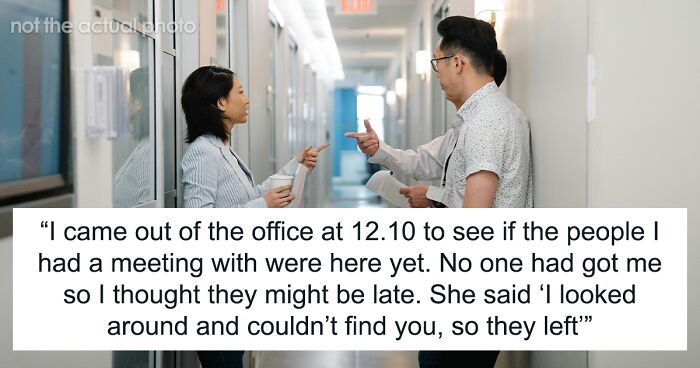
Boss Organizes Important Meeting For Over 5 Months, Is Livid When Colleague Sabotages It
Interview With ExpertNo matter what role you play in your workplace, you’ve got to try and get along with everyone who works there. Sometimes, the relationship between colleagues can get rocky if one person messes up or tries to sabotage the other for personal gain.
This is exactly what one woman faced after her coworker made a huge mistake that ruined everything she had planned for. Even though it seemed like a silly gaffe at first, the poster wondered if the other woman had done it deliberately.
More info: Mumsnet
It’s a terrible feeling when someone else’s blunder at work causes problems for you
Image credits: Fox / Pexels (not the actual image)
The lady explained that she had been organizing a meeting with important clients for a couple of months and had even rearranged her schedule to accommodate it
Image credits: MART PRODUCTION / Pexels (not the actual image)
On the day of her meeting, a senior consultant wanted to discuss something with her, so she informed her colleagues about where she would be and had the discussion in a far-off room
Image credits: cottonbro studio / Pexels (not the actual image)
Nobody came to call her when the clients came for the meeting, and she later found out that her junior colleague had not made any effort to find her
Image credits: WilloWhisperer
The woman was annoyed with her colleague because it cost her a lot of work, and she felt like the other woman had done this to “prove a point”
The OP told netizens that her junior coworker was in charge of escorting and directing people around parts of the office. Despite that, the other lady did not even take a few minutes to find the poster and tell her that her clients had arrived. It seemed like she was being “purposely difficult” because she did not even apologize for her mistake later on.
Since you’ve got to spend so much time with people at work, it helps to build a good relationship with them. In situations like this when they seem to be intentionally causing trouble for you, it’s difficult to know how to skillfully handle such matters. That’s why Bored Panda reached out to Peter Duris, CEO and co-founder of Kickresume, to get his insights on the matter.
He told us that “in this case, the employee should ask the junior colleague’s manager to remind the team about the importance of communication. That’s essential when clients are involved. If they have no clear process for handling client arrivals, one should be put in place and communicated to the whole team. The employee could also talk to the junior and explain the impact of their mistake.”
It’s essential to also determine whether the coworker has always been making mistakes like this or if it’s only a recent occurrence. Sometimes, folks might be dealing with difficult personal matters that might affect their performance at work. Being direct and speaking to them about the issue can make a big difference.
Peter Duris also told us that “we should be kind to interns, juniors, and younger or less experienced colleagues. Mistakes are often made by people with good intentions who are trying their best. If seniors already have empathy for juniors, giving constructive feedback is another step. On the other hand, unnecessarily harsh critique can damage your relationships with your colleagues.”
Image credits: Felicity Tai / Pexels (not the actual image)
The poster mentioned that her junior had a tendency to do things to prove a point, and that’s why she felt her actions were done on purpose. The main issue was that missing out on meeting the clients meant that the OP’s months of hard work had gone to waste, and it also wouldn’t bode well for her reputation.
Experts say that it’s essential to do damage control in a situation like this. Talk to the company’s leadership and set the record straight about what exactly happened. It helps to also have evidence to corroborate your story. This can be in the form of emails, messages, or even video proof.
We also asked Peter what workers could do to smooth things over with clients in case a mistake like this happens. He said that “when a junior messes up things with an important client, the senior should avoid directly mentioning the junior’s mistake. Instead, they should accept responsibility as a team and apologize for the communication issue.”
“If the client already knows a junior was at fault, the senior can reassure them that extra training will be provided to prevent similar problems. The senior should personally reach out to the client, suggest rescheduling the meeting, and take a hands-on approach to make things right,” he added.
Whether the woman decides to confront her junior about the mistake or not, it would be great if the clients quickly agreed to another meeting. There’s no update on how she handled things with the other woman, but what exactly do you think the OP should do? We’d love to hear your ideas.
Folks were divided on the issue, and some felt that the poster was at fault for not being present for the meeting, while others thought that the coworker was completely in the wrong
Poll Question
Thanks! Check out the results:
If you work for the same company, you are all on the same team, regardless of what "team" you're actually assigned to. Lost business is lost business for everyone, if it is within your ability to help, you help each other.
Talk about scapegoats. Failing to turn up on time for an 'important' meeting is unprofessional in the extreme. Trying to get a junior colleague blamed for your own poor time-management is just despicable.
Oh come on. There is a person in the office responsible (and supposedly dependable) for announcing to people when the reps from the other company have arrived. Do you think lawyers should sit in the lobby? Doctors in the waiting room?
Load More Replies...It's weird to get angry that people left because you were late to your own meeting. There was no effort to let attendees know to wait, no sign on the door, no email sent saying you might be late but sit down. If you don't have a dedicated assistant or receptionist, that's pretty standard. Sounds like OP beingate and not meeting their own guests is a habit. No mention of the room having any indication of a meeting, welcome slide, tea/coffee etc. might not be the first time they had to wait around for OP. Doesn't show the kind of problem solving skills/anticipating needs of someone you want to work a project with anyway. Just confirmed by blaming someone who is not a receptionist for not being a receptionist.
Seriously? Everyone saying s/he should have been on time or early to meet with the other team: have you never worked in an office before? It is very common that you do work until the time of your meeting. Sometimes people are early, other times, they run late, still others they are a no-show. Are you supposed to sit on your hands until they appear? Also, it didn't seem like they relied on the female member of their team exclusively. Just that they asked their team to tell them when their people were there for the meeting. Quite frankly, I think she's at fault. Unless everything that falls on an admin falls on her desk and on one else's, she should have looked harder. That just seems rude on her part.
Wow group of people saying get her sacked, or maybe you shud hire a receptionist who could phone you to let you know someone there, instead of dumping more work on a already busy overworked junior
Or even just as simple as setting a timer on their phone for 12 so they know to wrap it up...
Load More Replies...If they are in the same company they can come back it's only 10 minutes. The junior is at fault for not at least ringing a team member to find out where she was. Good lord, my managers weren't the ones who greeted the guests I WAS and took them too the meeting room and got the boss if they were dealing with another issue. They would greet them if they were sitting around doing nothing which would be unusual.
It was on them to either tell the consultant they had a meeting and would have to finish by 11:50 at the latest or arrange another time if there wasn't sufficient time. They also could have left a message or sent an email saying they had a prior meeting so those attending knew and could work around that. They chose to come out later than the meeting time and relied too heavily on others to carry this when it's pretty easy to work this The other person could have done more but ultimately they weren't the one that was in control of that the other person didn't make sure they were on time to meet. You'd think if it was so hard to arrange they would have done something themselves to make sure they were there.
If you work for the same company, you are all on the same team, regardless of what "team" you're actually assigned to. Lost business is lost business for everyone, if it is within your ability to help, you help each other.
Talk about scapegoats. Failing to turn up on time for an 'important' meeting is unprofessional in the extreme. Trying to get a junior colleague blamed for your own poor time-management is just despicable.
Oh come on. There is a person in the office responsible (and supposedly dependable) for announcing to people when the reps from the other company have arrived. Do you think lawyers should sit in the lobby? Doctors in the waiting room?
Load More Replies...It's weird to get angry that people left because you were late to your own meeting. There was no effort to let attendees know to wait, no sign on the door, no email sent saying you might be late but sit down. If you don't have a dedicated assistant or receptionist, that's pretty standard. Sounds like OP beingate and not meeting their own guests is a habit. No mention of the room having any indication of a meeting, welcome slide, tea/coffee etc. might not be the first time they had to wait around for OP. Doesn't show the kind of problem solving skills/anticipating needs of someone you want to work a project with anyway. Just confirmed by blaming someone who is not a receptionist for not being a receptionist.
Seriously? Everyone saying s/he should have been on time or early to meet with the other team: have you never worked in an office before? It is very common that you do work until the time of your meeting. Sometimes people are early, other times, they run late, still others they are a no-show. Are you supposed to sit on your hands until they appear? Also, it didn't seem like they relied on the female member of their team exclusively. Just that they asked their team to tell them when their people were there for the meeting. Quite frankly, I think she's at fault. Unless everything that falls on an admin falls on her desk and on one else's, she should have looked harder. That just seems rude on her part.
Wow group of people saying get her sacked, or maybe you shud hire a receptionist who could phone you to let you know someone there, instead of dumping more work on a already busy overworked junior
Or even just as simple as setting a timer on their phone for 12 so they know to wrap it up...
Load More Replies...If they are in the same company they can come back it's only 10 minutes. The junior is at fault for not at least ringing a team member to find out where she was. Good lord, my managers weren't the ones who greeted the guests I WAS and took them too the meeting room and got the boss if they were dealing with another issue. They would greet them if they were sitting around doing nothing which would be unusual.
It was on them to either tell the consultant they had a meeting and would have to finish by 11:50 at the latest or arrange another time if there wasn't sufficient time. They also could have left a message or sent an email saying they had a prior meeting so those attending knew and could work around that. They chose to come out later than the meeting time and relied too heavily on others to carry this when it's pretty easy to work this The other person could have done more but ultimately they weren't the one that was in control of that the other person didn't make sure they were on time to meet. You'd think if it was so hard to arrange they would have done something themselves to make sure they were there.

 Dark Mode
Dark Mode 

 No fees, cancel anytime
No fees, cancel anytime 



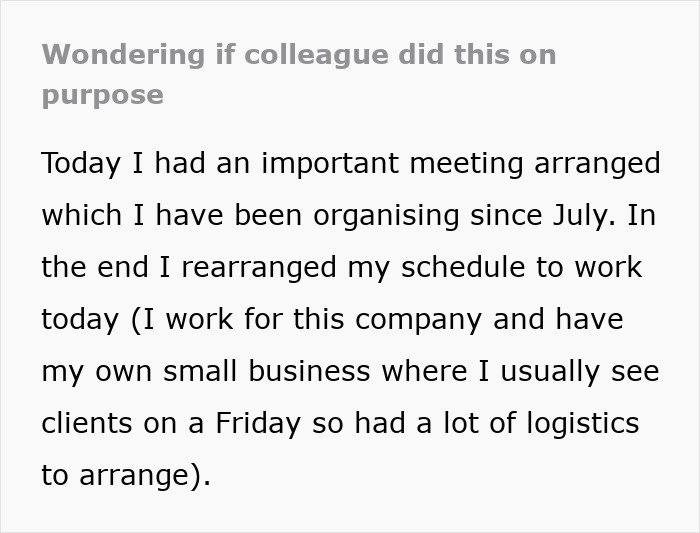
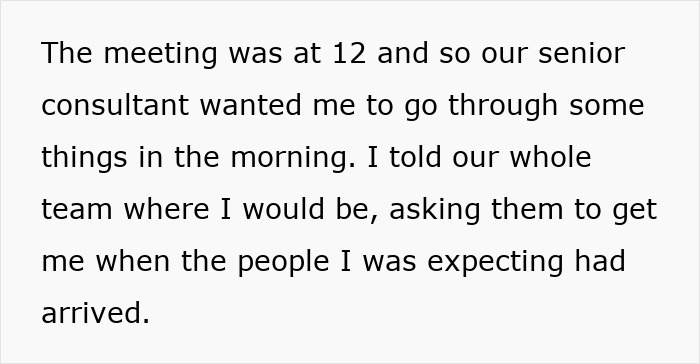

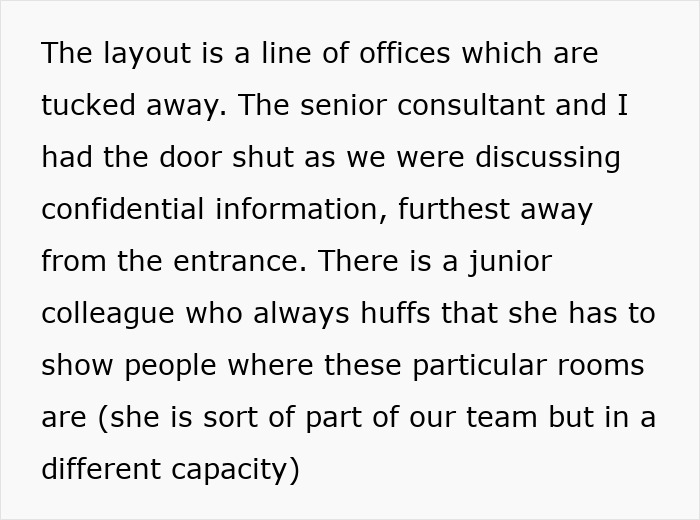
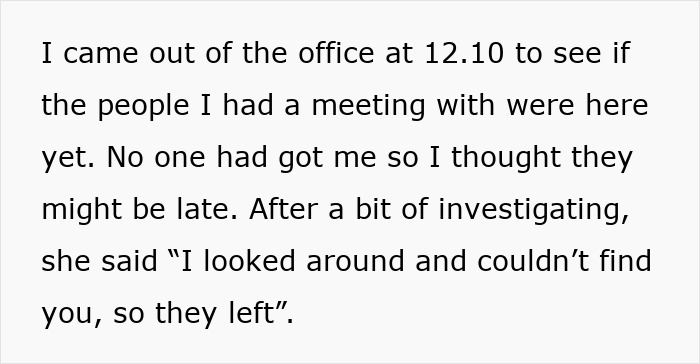
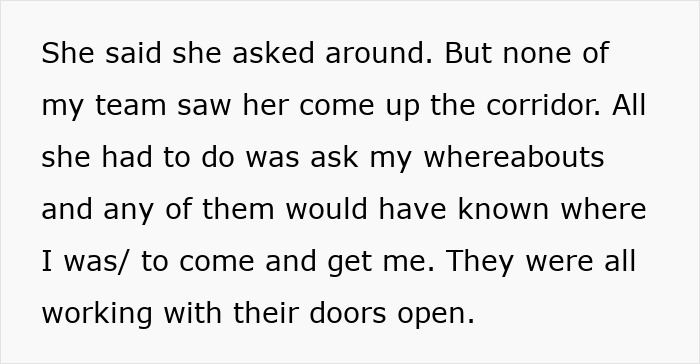

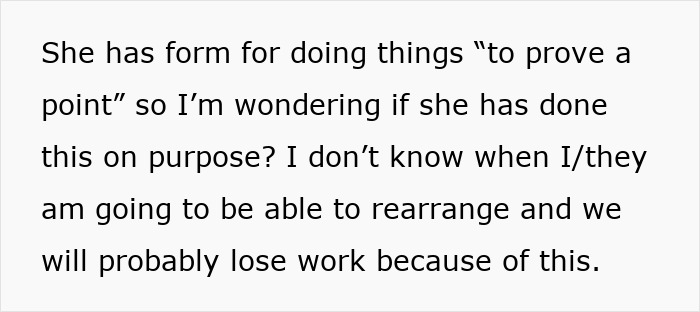
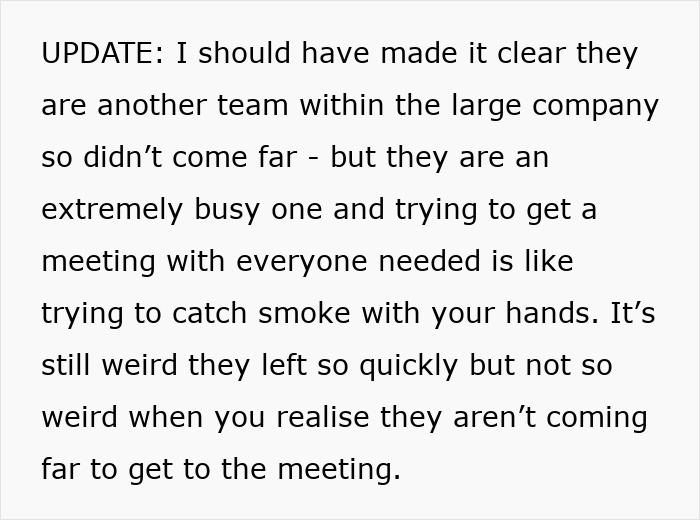

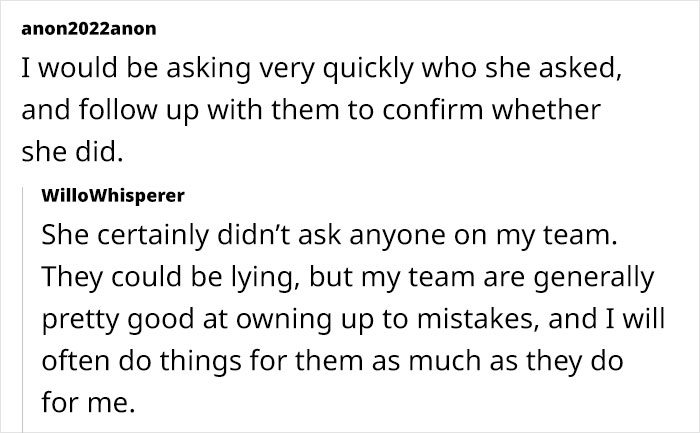
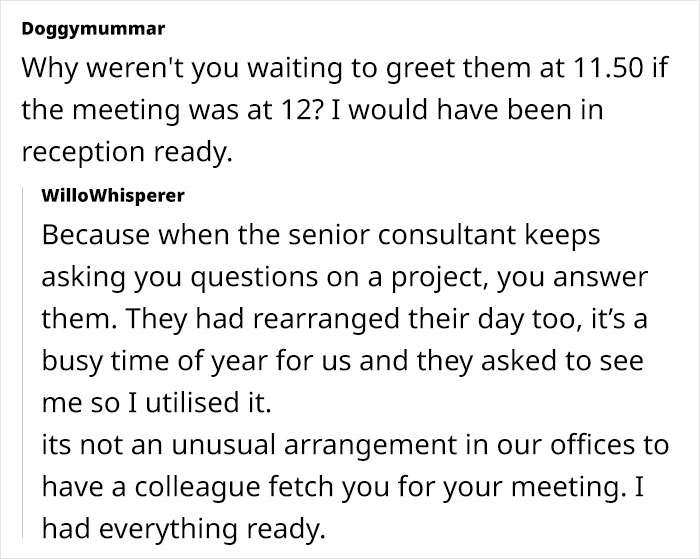
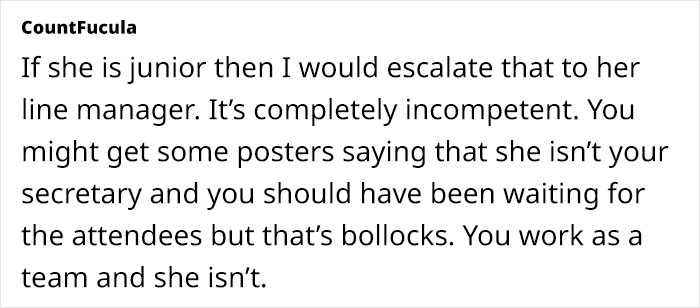

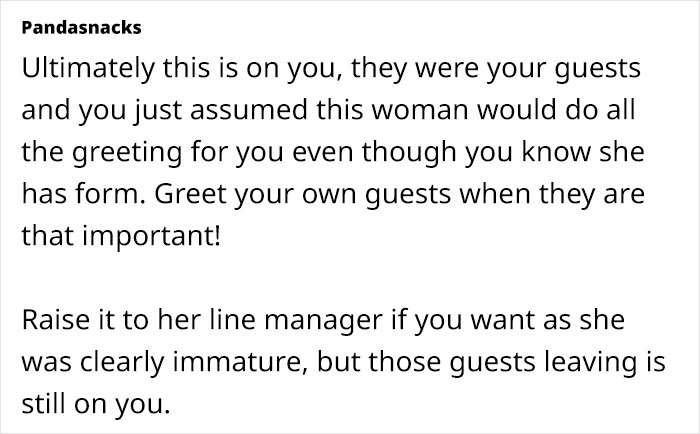




















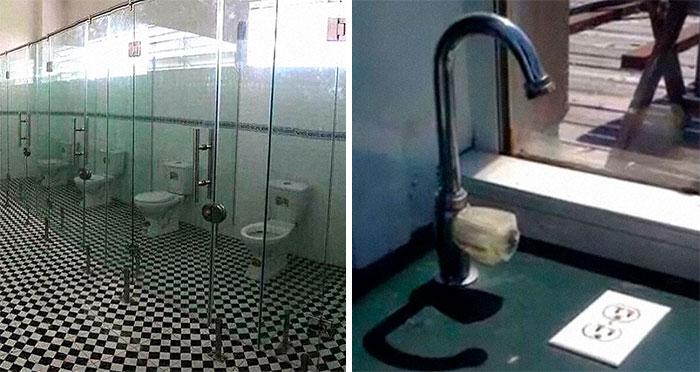
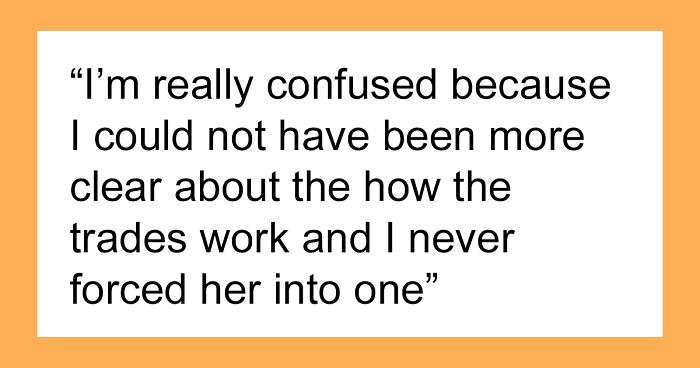









32
11